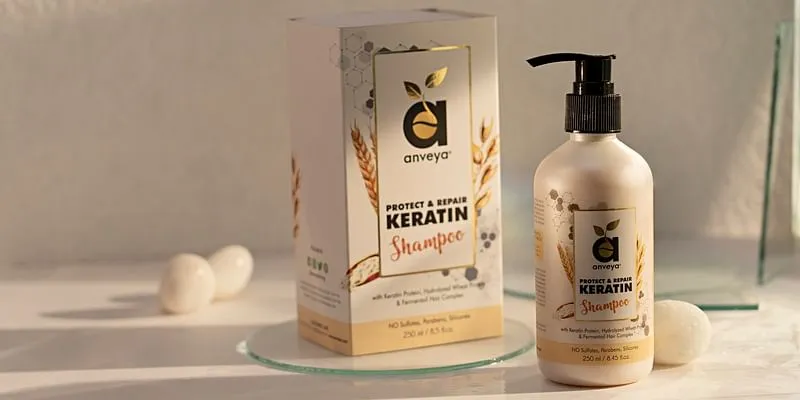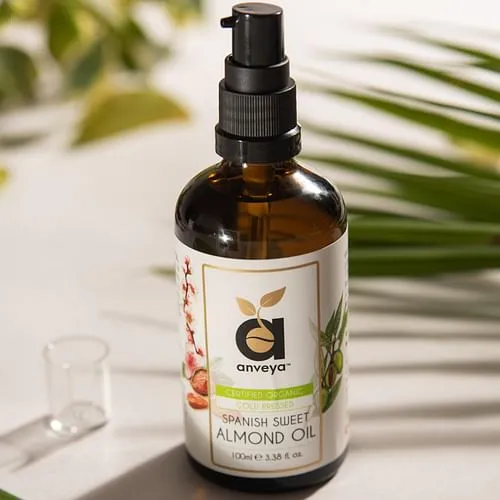This duo made and sold premium beauty products on their website, Amazon, and Flipkart. Now their business earns Rs 1 Cr monthly revenue
Looking to launch a beauty products brand that could mirror or beat international brands in terms of product quality, Vivek Singh and Saurav Patnaik started Anveya Living in Bengaluru in 2018.
When his wife travelled internationally, Vivek Singh noticed she would buy hair products from abroad. She insisted there were no Indian hair products that matched the quality of premium international brands.
Vivek and his friend Saurav Patnaik spoke to friends and family and realised this was a common notion across beauty products. Digging deeper into why there were no Indian brands of similar quality, they found that product research conducted in labs across the world took too long to reach India, if at all.
This inspired them to figure out a way to work with these labs to bring innovation to India faster, and launch a beauty products brand that could mirror or beat international brands in terms of product quality.
Bringing their vision to life, they invested their personal savings and some funds raised from friends and family to start Living in Bengaluru in 2018.
Vivek says:
“Creating high quality products was the core of our vision and so our early investments went into R&D and sourcing. We decided to reach consumers through the internet, and this meant we didn’t have to invest in building pan-India distribution.”

A shampoo product by Anveya
The early days
Now a team of 15, Anveya Living initially began operating out of a single warehouse. The Anveya range started in 2019 with pure essential oil extracts and cold-pressed beauty oils. The brand then conducted R&D on a formulated range and launched it in 2020.
The same year, Vivek and Saurav also launched a second brand, ThriveCo, a dermatological product range aiming at solving hair and skin problems.
Working on their own formulations and partnering with R&D labs in countries like Germany and Switzerland, they tied up with manufacturers of hair and skin formulations based in Baddi, Chandigarh, and Noida to make the products.
Vivek says, “We now have a range of 40 products in hair care, skincare, cold-pressed oils, and essential oils. We sell them on Amazon and , and on our own ecommerce stores www.anveya.com and www.thriveco.in. Last month, we clocked revenue of Rs 1 crore. By the end of this year, we aim to grow four-fold and reach Rs 4 crore monthly revenue.”
Focus on premium segment
The founders had seen the Indian consumer historically served with relatively lower quality products compared to international ones.
Saurav says:
“Ingredients that were rejected by several countries were still being served here. So we wanted to make sure that we got only the best and most effective products possible. This led to a challenge in terms of the perception that Indian products don’t work as well as some of the international ones. This is a perception that we have been working towards changing over the years.”
Anveya has been challenging this perception by focussing on delivering premium, high-quality products and not limiting itself in terms of the cost of raw materials or production.
Saurav adds, “Large brands, especially if focussing on the mass segment, tend to start their R&D with cost-centric benchmarks and limitations in mind. We focus on the premium segment and hence we don’t compromise at any stage, right from research and formulations to sourcing of raw materials.”
This approach allows Anveya to import raw materials as well as source some locally, based on whatever works best for the product being developed.

An almond oil by Anveya
The D2C advantage
As a D2C business, the company runs its own ecommerce stores and directly manages its presence on Amazon and Flipkart without the involvement of any mediators or resellers. The team operates the warehouse and directly deals with the logistics.
Vivek says, around 60 percent of sales come from their own ecommerce stores and the rest from online marketplaces.
Explaining why the ecommerce stores are popular channels for sales, Vivek says:
“We should be able to explain our USP to discerning customers in a conversational and transparent manner. Fifteen-second TV ads or online marketplaces don’t work that way. Having our own ecommerce storefronts allow us to communicate the way we want to our customers.”
Dealing with customers directly also helps Anveya receive direct feedback, which it analyses to come up with and develop new products.
The road ahead
Spurred by the digital wave, the Indian market for cosmetics products (which includes skincare and hair care) is estimated to grow at a CAGR of 4.23 percent to $20 billion between 2020 and 2025, according to data from Mordor Intelligence and Statista.
Although the COVID-19 pandemic impacted Anveya initially, the founders say business has recovered and they are continuing to expand into this market. They plan to launch new categories and expand their product portfolio to around 70 products this year.
So far, Anveya has grown without external investors and the founders say they might raise funds this year. They also plan to expand the reach of Anveya and ThriveCo’s ecommerce stores.
Vivek says, “As a brand, we found large adoption before and after the pandemic and the internet as a way to engage with our customers has only accelerated. This trend of online adoption has also strengthened the position of many other brands and businesses dependent on the internet.”
Saurav adds, “We are filling a gap which has been largely ignored. There are only a few brands doing the good work that the consumers of the country deserve. We look at them as inspiration rather than competition, and we hope that they succeed as well.”
Edited by Megha Reddy








